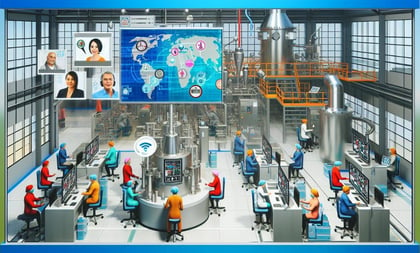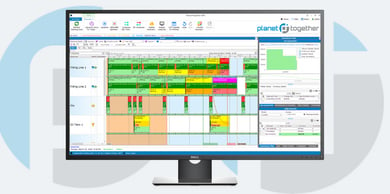Remote and Virtual Collaboration in Manufacturing Teams
As a Plant Manager in pharmaceutical manufacturing, you're constantly seeking innovative ways to streamline operations, enhance productivity, and ensure compliance with stringent regulations. One such innovation that has been gaining traction in recent years is remote and virtual collaboration in manufacturing teams. This paradigm shift is reshaping how teams operate, communicate, and collaborate, ultimately leading to improved efficiency, reduced costs, and accelerated time-to-market.
In this blog, we'll look into the transformative power of remote and virtual collaboration in pharmaceutical manufacturing, exploring its benefits, challenges, and best practices. Moreover, we'll highlight the crucial role of integration between advanced planning and scheduling (APS) solutions like PlanetTogether and leading enterprise resource planning (ERP), supply chain management (SCM), and manufacturing execution systems (MES) such as SAP, Oracle, Microsoft, Kinaxis, and Aveva in facilitating seamless collaboration across distributed teams.

Remote and Virtual Collaboration in Manufacturing
Remote and virtual collaboration in manufacturing involves leveraging digital technologies and communication tools to enable teams to work together effectively regardless of their physical location. This approach breaks down geographical barriers, allowing experts from different departments, locations, or even organizations to collaborate in real-time, share insights, and make informed decisions collectively.
In pharmaceutical manufacturing, where precision and compliance are critical, remote collaboration offers several compelling advantages:
Enhanced Flexibility: Remote collaboration enables team members to access critical data and participate in discussions from anywhere, whether it's the manufacturing floor, a remote office, or even their homes. This flexibility promotes a more agile and responsive workforce, capable of addressing challenges and seizing opportunities in real-time.
Cost Savings: By reducing the need for travel and maintaining physical infrastructure, remote collaboration can lead to significant cost savings for pharmaceutical companies. Moreover, it allows organizations to tap into global talent pools without incurring relocation expenses, thereby optimizing resource allocation and improving overall efficiency.
Improved Efficiency: Virtual collaboration tools facilitate seamless communication and information sharing among team members, eliminating delays associated with traditional communication channels. This enhanced efficiency translates into faster decision-making, accelerated project timelines, and ultimately, improved operational performance.
Better Work-Life Balance: Offering employees the flexibility to collaborate remotely promotes better work-life balance, leading to higher job satisfaction, increased productivity, and lower turnover rates. In the highly competitive pharmaceutical industry, attracting and retaining top talent is essential for sustained success.

Challenges and Best Practices
While the benefits of remote collaboration are undeniable, implementing and managing virtual teams in a manufacturing environment poses its own set of challenges. Some common challenges include:
Technological Barriers: Ensuring that all team members have access to the necessary digital tools and infrastructure can be a logistical challenge, particularly in geographically dispersed organizations. Moreover, integrating disparate systems and ensuring data security are additional concerns that need to be addressed.
Cultural Resistance: Transitioning to a remote work model may encounter resistance from employees accustomed to traditional, on-site work environments. Overcoming cultural barriers and fostering a collaborative mindset across the organization is essential for the success of remote collaboration initiatives.
Communication Breakdowns: Effective communication lies at the heart of successful collaboration. However, in a remote setting, miscommunication and misunderstandings can occur more easily, especially in cross-cultural teams. Implementing clear communication protocols and leveraging collaborative tools with built-in communication features can mitigate these risks.
Managing Performance: Monitoring and evaluating the performance of remote teams can be challenging without direct oversight. Establishing clear performance metrics, setting achievable goals, and providing regular feedback are essential for maintaining accountability and ensuring that remote teams remain aligned with organizational objectives.
To address these challenges and maximize the benefits of remote collaboration, pharmaceutical manufacturers can adopt the following best practices:
Invest in Technology: Implementing robust collaboration tools and ensuring seamless integration with existing ERP, SCM, and MES systems is crucial for enabling effective remote collaboration. Solutions like PlanetTogether offer advanced planning and scheduling capabilities, while platforms such as SAP, Oracle, Microsoft, Kinaxis, and Aveva provide comprehensive ERP, SCM, and MES functionalities.
Provide Training and Support: Empowering employees with the skills and resources they need to thrive in a remote work environment is essential. Offering training programs, technical support, and access to user-friendly collaboration tools can help employees adapt to remote work more smoothly and maximize their productivity.
Promote Communication and Transparency: Foster a culture of open communication and transparency within remote teams, encouraging active participation and idea sharing. Utilize collaboration platforms that facilitate real-time communication, document sharing, and virtual meetings to keep team members connected and engaged.
Establish Clear Processes and Guidelines: Define clear processes, workflows, and guidelines for remote collaboration, outlining expectations, roles, and responsibilities for team members. Regularly review and update these guidelines to reflect evolving business needs and technological advancements.

Integration Between PlanetTogether and ERP/SCM/MES Systems
In the context of remote collaboration, seamless integration between advanced planning and scheduling (APS) solutions like PlanetTogether and leading ERP, SCM, and MES systems is critical for ensuring data accuracy, consistency, and accessibility across the organization.
By integrating PlanetTogether with ERP systems such as SAP, Oracle, Microsoft Dynamics, or MES systems like Aveva and Kinaxis, pharmaceutical manufacturers can achieve:
Real-Time Data Syncing: Integration enables real-time synchronization of production plans, schedules, inventory levels, and other critical data between APS and ERP/SCM/MES systems, ensuring that all stakeholders have access to up-to-date information.
Streamlined Workflows: Integrated systems facilitate seamless communication and collaboration between planning, production, procurement, and distribution teams, streamlining workflows and minimizing manual data entry errors.
Improved Decision-Making: By providing comprehensive visibility into production operations and supply chain activities, integrated systems empower decision-makers to make data-driven decisions quickly and confidently, even when working remotely.
Enhanced Compliance: Integration ensures consistency and accuracy in data management, helping pharmaceutical manufacturers maintain compliance with regulatory requirements and quality standards, regardless of team members' physical locations.
Remote and virtual collaboration represents a paradigm shift in pharmaceutical manufacturing, offering unparalleled opportunities for efficiency, innovation, and agility.
By embracing digital technologies, fostering a collaborative culture, and leveraging integrated solutions like PlanetTogether with ERP/SCM/MES systems, plant managers can lead their teams to new heights of productivity and success in the dynamic and competitive pharmaceutical industry.
Are you ready to take your manufacturing operations to the next level? Contact us today to learn more about how PlanetTogether can help you achieve your goals and drive success in your industry.


